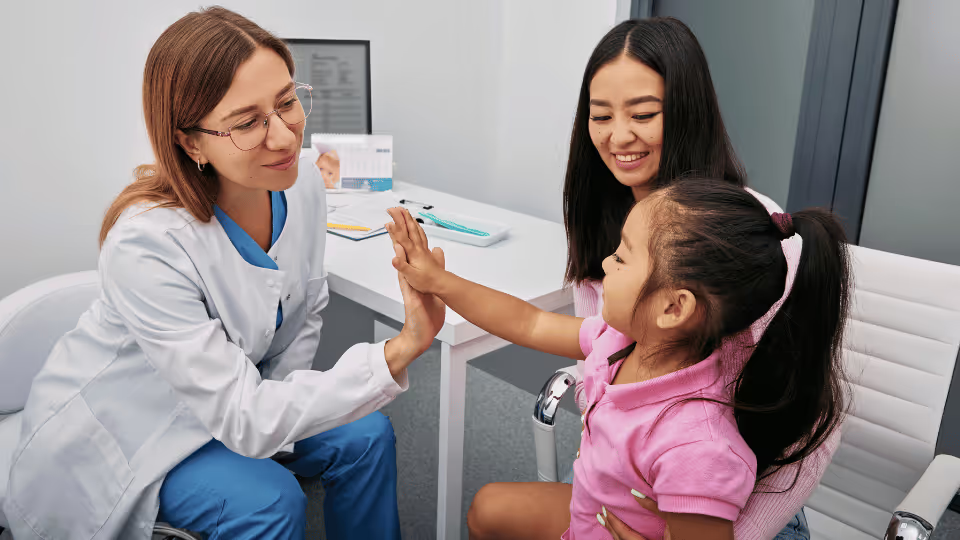
Coral Care content is reviewed and approved by our clinical professionals so you you know you're getting verified advice.
Find effective support for developmental delays, quickly.



Concerned about your child's development?
Our free screener offers guidance and connects you with the right providers to support your child's journey.
When children face developmental challenges, pediatric therapies become crucial in helping them grow. This guide covers different types of pediatric therapies, including speech, occupational, and physical therapy, and their benefits in aiding your child’s development.
Key takeaways
- Pediatric therapies enhance child development by targeting communication, motor skills, and sensory processing, which leads to improved social integration and overall quality of life.
- Individualized treatment plans, created through collaboration among therapists, parents, and children, ensure therapies are tailored to each child’s specific developmental needs.
- Family involvement in therapy, through education and collaboration, is essential for reinforcing therapeutic strategies at home and enhancing the effectiveness of interventions.
Introduction to pediatric therapies

Comprehensive pediatric therapy services support various aspects of child development by addressing specific needs through tailored interventions. Knowing the different types of pediatric therapies helps parents make informed decisions to provide the most effective support for their child. In addition, therapy services support not only the child’s development but also the family and school environment. Collaboration with therapists helps families gain insights and strategies to reinforce therapy at home, ensuring consistent support across all areas of the child’s life.
Pediatric therapies significantly enhance children’s development, and each unique type focuses on a targeted area - such as communication, motor skills, sensory processing, feeding, or self-care skills such as dressing and toiletting. Many of these therapies improve social skills, help children form relationships, and integrate into educational and social settings.
Pediatric therapy often leads to notable advancements in children’s abilities, enhancing their relationships and aiding their integration into educational and community settings. Understanding these benefits allows parents to better support their child and help them reach success and overall development.
This guide explores various types of pediatric therapies and their benefits, including speech, occupational, and physical therapy. Each type offers unique advantages that help children overcome developmental issues and thrive, allowing parents to make informed decisions about their child’s treatment. Let’s dive deep!
Types pediatric therapy services for your child

Comprehensive pediatric therapy services support various aspects of child development through specialized interventions. When parents understand the different types of pediatric therapies, they can make more informed decisions about their child’s needs.
The following sections explore three primary types of pediatric therapy services: speech therapy, occupational therapy, and physical therapy. Each therapy addresses specific developmental challenges and provides targeted support to help children reach their full potential. Ensuring you get your child the type of therapy that will best help them overcome their personal obstacles is paramount for your child’s success.
Speech therapy
Speech therapy focuses on promoting communication growth and integration into real-world situations. This type of therapy can address conditions such as cognitive communication disorders, therefore enhancing children’s communication and social interaction abilities (University of St. Augustine’s). Since every patient is different, speech therapy can be specially tailored to each client’s needs. Whether your child is struggling with stuttering, partial loss of speech, difficulty understanding words or language, or any other variety of speech disorders - pediatric speech therapy can help them learn strategies to correct their impediment (Cleveland Clinic).
Collaboration between therapists and families is essential in creating a supportive environment that addresses the child’s speech and language needs effectively. Through this collaborative approach, children can receive consistent support both in therapy sessions and at home, leading to more significant advancements in their communication skills. Case studies have shown that children participating in speech therapy often exhibit notable improvements in their ability to communicate as well as regulate their emotions.
Occupational therapy
Occupational therapy enhances fine motor skills, visual-motor skills, and self-care capabilities, helping children perform daily tasks and overcome physical, sensory, or cognitive challenges. Addressing these challenges supports children’s overall development and independence - leading to higher levels of satisfaction in both children and caregivers.
Occupational therapists play a crucial role in helping children develop essential skills for daily activities. Whether it be making the home more accessible, teaching strategies to help regulate emotions, or using social thinking curriculum to help improve social interactions, occupational therapy is a great tool to help children' s development and independence.
Occupational therapy provides personalized support that enhances each child’s development and well-being. It is integral to comprehensive pediatric therapy services, helping children develop the skills needed to succeed in daily life.
Physical therapy
Physical therapy enhances children’s gross motor skills, strength, coordination, and overall mobility through targeted exercises. Addressing these physical challenges helps children achieve greater independence and mobility. Physical therapists work with children to develop personalized treatment plans that address their specific needs. These plans often include exercises aimed at enhancing strength, coordination, and overall physical capabilities. By focusing on these areas, physical therapy can significantly improve a child’s ability to perform daily tasks and participate in various activities.
Physical therapy profoundly impacts children’s lives. By helping overcome present challenges, as well as teaching strategies that will help avoid future injuries, physical therapy gives children the ability to move and function the way they want to.
Individualized treatment plans
Customized treatment plans address the unique challenges faced by each child, leading to more effective interventions. Tailored plans in each type of pediatric therapy focus on a child’s distinct developmental needs, ensuring they receive the specific support required for success.
The following sections explore key components of individualized treatment plans: Evaluation Process, Goal Setting, and Progress Monitoring. These elements create a comprehensive support system that addresses each child’s unique needs and fosters their development.
Evaluation process
The evaluation process of creating an individualized treatment plan identifies specific developmental issues, allowing for tailored intervention strategies. Comprehensive assessments provide detailed insights into a child’s developmental milestones and challenges, essential for developing personalized treatment plans (Gray Group International).
Collecting comprehensive data during the evaluation process allows therapists to formulate effective treatment strategies that address identified developmental challenges. This thorough approach ensures therapy is tailored to the child’s specific needs, enhancing the effectiveness of interventions.
Goal setting
Collaboratively establishing objectives among therapists, parents, and children ensures goals are realistic, achievable, and clear to all parties involved. This approach promotes shared decision-making and communication, aligning therapy with the family’s goals and values.
Collaborative goal setting encourages input from children and families, leading to more effective and engaging therapy sessions. This approach helps establish a support system that aligns with the child’s needs and fosters engagement, enhancing success in therapy.
Progress monitoring
Regular assessments track a child’s development, allowing for necessary adjustments to the treatment plan. Monitoring progress ensures therapy remains aligned with the child’s evolving needs and abilities, maintaining its effectiveness.
Progress monitoring uses specific assessments to evaluate a child’s advancements and adapt treatment plans. By using diagnostic tests and pivoting to the most pressing obstacle to overcome, leads to the most amount of success for each child.
Pediatric therapy’s part in developing speech skills
Social skills development is a critical component of children’s overall growth and success. Occupational therapy promotes social skills by allowing children to practice managing emotions and frustrations during activities. Engaging parents in therapy supports the child’s progress and encourages healthy habits between sessions, improving social interaction abilities and fostering stronger relationships within school and community settings.
In the following subsections, we will explore strategies for enhancing social interactions and the benefits of group therapy sessions. By focusing on these areas, children can develop the social skills necessary for forming meaningful relationships and integrating effectively into their social environments.
Social interaction strategies
One such strategy is modeling; modeling appropriate social behaviors helps children understand and practice social interactions (Everyday Speech). Teaching clear communication and active listening improves their social interaction abilities. Parents often express gratitude for the personalized care their children receive, noting significant positive changes.
Implementing these strategies helps children develop better social skills and form stronger relationships with peers. These techniques are essential for navigating social situations and building confidence in interacting with others.
Group therapy sessions
Group therapy provides a safe space for children to practice social skills with peers, fostering a sense of community and belonging while simultaneously improving communication. Participation in group therapy can boost children’s confidence in their social abilities by providing positive feedback from peers. Additionally, participating in group therapy allows children to learn from observing their peers, which can accelerate their social development (National Institutes of Health).
Helping children develop conflict resolution skills is crucial for maintaining positive relationships and managing disagreements peacefully. By participating in group therapy sessions, children can gain valuable social skills that will benefit them in various aspects of their lives.
Family involvement in therapy
Family involvement is crucial in supporting a child’s therapy journey, as it directly influences their success. Strong therapist-parent relationships are imperative for a child’s success during therapy. Therapists with substantial experience and qualifications enhance the effectiveness of pediatric therapy by fostering stronger connections with children and their families.
In the following subsections, we will explore the importance of parent education and the benefits of a family-centered approach. By involving families in the therapy process, children can receive consistent and supportive care that enhances their development.
Parent education
Parents receive tailored strategies to reinforce therapy concepts at home, enhancing continuity of care. When therapists train parents to implement therapy strategies at home, they can foster a supportive and consistent environment for their child’s development. A good therapist will create individual plans for each parent to take home and support therapy reinforcement. This approach ensures that children receive consistent support and that therapy techniques are effectively integrated into daily routines.
At Coral Care, our in-home therapy provides many families with personalized treatment plans tailored to home and your family’s day-to-day routine. This approach puts your child first, saves time, reduces the hassle of traveling to appointments, and allows therapists to create highly personalized treatment plans tailored to the child’s home environment
Family-centered approach
A family-centered approach emphasizes the role of families in supporting their child’s therapy journey, ensuring that the child’s needs are fully addressed. Providing education and resources for parents helps them to reinforce therapy techniques at home, making therapy more effective. Collaborative goal setting involves therapists, parents, and children working together to set realistic and achievable goals that cater to the child’s specific needs.
Regular progress monitoring allows families and therapists to assess the child’s development effectively and adjust treatment plans as needed. This approach ensures that therapy remains aligned with the child’s evolving needs and supports their ongoing success.
Coral Care for pediatric therapies
Coral Care is a top choice clinic for pediatric therapies, offering a compassionate and comprehensive approach to supporting children and their families. What sets Coral Care apart is its commitment to delivering high-quality care right in the comfort of your own home. This in-home therapy model ensures that children can receive personalized attention and treatment in an environment where they feel most comfortable, helping to reduce any stress or anxiety that might come with visiting a clinic. Whether it's speech therapy, occupational therapy, physical therapy, or other pediatric services, Coral Care's therapists come to you, making the process as convenient and effective as possible.
One of the major advantages of choosing Coral Care is their unique no-wait-list policy. Unlike many other pediatric therapy providers who may have long wait times for new patients, Coral Care prioritizes timely access to care. This ensures that children get the therapy they need when they need it, without delays or disruptions in their progress. This commitment to immediate care helps children make steady advancements in their development, without being held back by unnecessary waiting periods.
The team at Coral Care is composed of highly experienced professionals, each dedicated to providing the best possible care for children. With a staff of skilled therapists who specialize in a variety of pediatric therapies, Coral Care brings a depth of expertise to every case. These professionals take a holistic approach to each child’s needs, working closely with families to create individualized therapy plans that foster long-term success. Whether it’s improving communication skills, motor functions, or overall development, Coral Care’s team is committed to delivering the highest standards of care and helping children thrive.
For families seeking a pediatric therapy provider that offers exceptional service, convenience, and expertise, Coral Care is the clear choice. With in-home care, no wait lists, and a dedicated team of professionals, Coral Care ensures that every child receives the support they need to reach their fullest potential. Join Coral Care today!
Summary
Throughout this guide, we have explored the various pediatric therapies that play a vital role in supporting children’s development. From speech therapy and occupational therapy to physical therapy, each type of intervention offers unique benefits that address specific developmental needs. By understanding these therapies, parents can make informed decisions about their child’s treatment and support their journey toward success.
Individualized treatment plans, including comprehensive evaluations, collaborative goal setting, and regular progress monitoring, are crucial for tailoring therapy to each child’s unique needs. Enhancing oral motor skills and feeding abilities, along with sensory integration and social skills development, further supports children’s overall growth and well-being.
The involvement of experienced and qualified therapists, specifically at Coral Care, along with the active participation of families, is essential for ensuring the effectiveness of pediatric therapy services. Ultimately, these comprehensive pediatric therapy services can lead to significant improvements in children’s lives, helping them reach their full potential.
Frequently Asked Questions
Coral Care stands out because of its unique in-home therapy model, which brings high-quality care directly to families' homes. In addition, Coral Care has a "no-wait-list" policy, ensuring that children receive therapy when they need it, without the long delays common at other providers.
Family involvement is essential in pediatric therapy, as it significantly boosts the therapy's effectiveness by providing consistent support and reinforcement at home. Engaging families in the process fosters a collaborative environment that enhances the child's progress.
Individualized treatment plans are created through thorough evaluations, collaborative goal setting, and consistent progress tracking, ensuring they address each child's unique needs effectively.
Pediatric therapies encompass speech therapy, occupational therapy, and physical therapy, catering to various developmental requirements. These therapies play a crucial role in fostering children's growth and skills.





